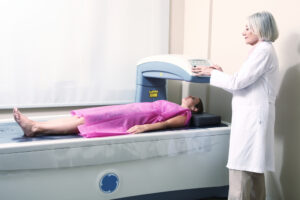A bone density test is a helpful tool which screens for problems with your bones before they happen. They can also monitor progress if you have osteoporosis. If you’re concerned about your bone density or risk for osteoporosis, you may be wondering when to have a bone density scan.
Aging Bones
As with everything else, getting older brings on all manner of problems like with vision, our changing hormones, hearing loss, and on and on. Our bones get older just as we do, and they lose mass or density making them weaker. Osteoporosis means “porous bones,” resulting in thin bones lacking in strength.

Most of us reach our peak bone mass in our 20s, and throughout our life, our old bones are replaced with new renewed bones. With osteoporosis, the bone mass is lost and not renewed, and patients are left with weak brittle bones that can break easily.
Scary Statistics
Most people are not aware how important strong bones are and the consequences of not having a bone density test.
One in four women with new spine fractures will have another within one year.
After a hip fracture, one quarter of people will die or never walk again due to lack of mobility and contracting pneumonia.
In women over age 45, time spent in the hospital after a fracture from osteoporosis is longer than other diseases like breast cancer, diabetes, and heart attack.
Early diagnosis is essential because one broken bone can signal more which can ultimately result in long term disability and loss of your independence.
Consider Your Risk Factors For Osteoporosis
Women are more likely than men to develop osteoporosis, this especially includes Caucasian and Asian women. Family history is a risk factor if your parents or siblings had it, and in addition, those who have small frames.
Obviously the older you get, the more you are at risk.
Recommendations For When To Have A Bone Scan
The goal is to find out if you have no bone loss, mild loss called osteopenia, or osteoporosis. If you only have mild loss, your doctor will monitor your diet and if you get enough Vitamin D and calcium.
The National Osteoporosis Foundation recommends the following guidelines to get your first test:
- Woman age 65 and older
- Men age 70 and older
- You break a bone after age 50
- Postmenopausal women younger than 65 with risk factors
- A woman of menopausal age with risk factors
- A man age 50 to 69 with risk factors
- You have lost 1.5 inches from your previous height
- You have lost .5 or more within a year
A bone density test is completely non-invasive with absolutely no pain involved.
Request an Appointment for Bone Density Testing
Call (404) 352-3616 to schedule a test with Atlanta Women’s Obstetrics & Gynecology if you have not had a bone density test and fall into one of the recommended categories.
